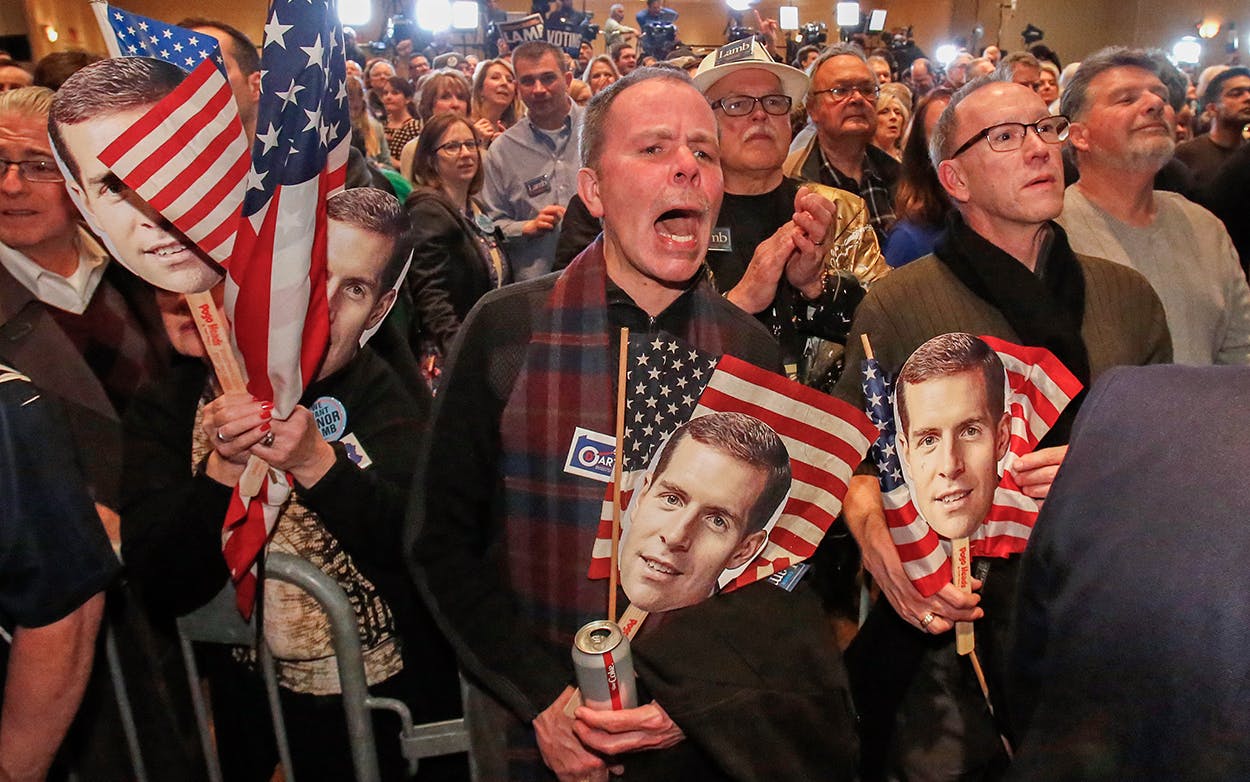The Democratic Party last won a majority of the seats in the U.S. House in the elections of a decade ago amid the worst national economic recession since the big one that swept the GOP out of power in 1932. Texas Democrats are coming up on a quarter century without winning a statewide office—the worst losing streak in the nation. So every special congressional election victory prompts Democrats into believing the tide is turning after the culture shock of Republican Donald Trump’s 2016 presidential victory and the mediocre record of the Republican-controlled Congress.
Then reality starts setting in. Conor Lamb’s win this week in the Pennsylvania special election over Trump-backed Rick Saccone at first looked like a Democratic victory in a district that Trump had taken by 20 points over Hillary Clinton. But it rapidly turned into a debate over whether the Democratic Party can be inclusive of moderates who can offer crossover appeal to conservative independents on issues like gun control, or whether it should just be the province of the far left, particularly on issues such as social justice, universal health care, and a living wage. The national argument is much like we’ve been seeing play out in Texas in the runoff between former Dallas County Sheriff Lupe Valdez and Houston businessman Andrew White. Politico called it the “Democrats’ civil war,” with conservatives arguing that the party needs to embrace Lamb’s centrist message while liberals dismiss that by claiming it is the progressive message that will send voters to the polls this year. To quote from Politico:
“He didn’t run on an identity politics, one-size fits all message,” said Rep. Kurt Schrader (D-Ore.), co-chairman of the Blue Dog PAC, the fundraising arm for the conservative Democratic coalition. “He ran on the Blue Dog message.”
And later in the article:
Some liberals are doing what they can to tamp down the victory lap moderates are taking post-Pennsylvania.
“People [who] say this is the direction all of us should take are kind of missing where the energy is coming from,” said Rep. Raul Grijalva (D-Ariz.), co-chairman of the Congressional Progressive Caucus. He mentioned issues such as universal health care, the minimum wage and regulating Wall Street as being especially important to base voters.
First, note that Lamb was close enough to the middle that House Speaker Paul Ryan described Lamb as a conservative, and Trump at a private fundraiser said Lamb won by embracing gun rights under the Second Amendment. “He ran on a campaign that said very nice things about me. I said, ‘Is he a Republican? He sounds like a Republican to me.’”
In one respect, Lamb is like White. He supports abortion rights while saying he is personally opposed to abortion. White’s position has been a deal breaker for Aimee Cunningham, the former finance chair of the Texas Democratic Party and an abortion-rights activist who claims White refused to say he would veto anti-choice legislation that reached his desk as governor. White has denied making such remarks to Cunningham but the debate lingers because of his personal belief. In a TribTalk op-ed, Cunningham wrote:
There is no place in the Democratic Party for a person who believes that I do not have the ability, right and judgement to make decisions about my body. This is both a matter of values and of strategy. No Democrat will win Texas without expanding and turning out the progressive base, which means turning out hundreds of thousands more young people, primarily young women of color, who share my beliefs.
A second point of difference between Lamb and the Texas Democratic candidates this year: Lamb supported firearm rights and ran a commercial of himself doing target practice with a machine gun. His first television commercial touted his service in the Marines and said he “still loves to shoot,” while showing him dressed in black firing a military-style rifle, much like the ones used in the mass shootings in Florida and Sutherland Springs.

White has accused Republican governor Greg Abbott of being “afraid” of the National Rifle Association and has said he supports setting the age to purchase a firearm at 21, restricting sales of high-capacity magazines, and banning the sale of bump stocks like those used in the Las Vegas mass shooting. Valdez also supports “sensible” limitations on firearms, including increased background checks, a ban on high-capacity magazines, and allowing law enforcement to remove firearms from Texans who have demonstrated a tendency toward violence.
One similarity between Lamb and a Texas politician this year is the temptation of the media to portray him and our state’s Democratic U.S. Senate nominee as looking like members of the Kennedy family. In celebrating Lamb’s victory, satirist Samantha Bee called him an “illegitimate Kennedy child.” Closer to home, Beto O’Rourke is often referred to as “Kennedyesque,” and as my colleague Eric Benson noted in his profile, one real member of the family jokes that O’Rourke is “known as the best looking Kennedy in Washington.”
If you’re trying to pin Lamb down in a comparison to Texas Democrats, it is more difficult than you might think. He supports retaining the Affordable Care Act, better known as Obamacare, and criticized the Republican tax cuts as a “giveaway” to the rich, stances in keeping with the Texas Democratic Party. But Lamb also supports Trump on his steel and aluminum tariffs, which could harm the Texas economy with its heavy reliance on steel for the petrochemical and auto industries—not to mention the price of aluminum used in beer cans. Texas Democrats have yet to take a position on Trump’s tariffs, but Republican U.S. Senator Ted Cruz, who is being challenged by O’Rourke, has said they would be bad for the state’s economy.
A protectionist approach served Lamb well in the union country of Pennsylvania. The 18th Congressional District is located in Western Pennsylvania steel country. Lamb promised to protect union rights, while Saccone supported anti-union “right to work” laws. The power of labor unions in Texas started to decline back when President Reagan appealed to the so-called Reagan Democrats in the eighties, and unions all but vanished as a major player in Texas politics in conjunction with the crash of the state Democratic Party. Labor can still help a candidate win a Democratic nomination, but it’s ineffective in general elections.
There are minor differences in how the Democratic identity debate is playing out nationally and in Texas, but they are alike in large ways. Nationally and in Texas, it can be argued that upticks in turnout are due to an energized progressive based, and that is one explanation for Texas Democrats earlier this month having the best turnout ever for a non-presidential year primary. It is just as easy, though, to argue that this was the first primary in years when the Texas Democrats had multiple candidates running in contested primary races at the local, state, and national level. Clinton in 2016 received a majority of the vote in the Texas 32nd Congressional District, and incumbent Pete Sessions won reelection unopposed. As Bee noted about Trump’s 20-point victory in Pennsylvania’s 18th Congressional District: “Two years ago, Democrats didn’t even bother running an opponent against the Republican incumbent. You know, I’m really enjoying the radical new Democratic strategy called trying!”
- More About:
- Politics & Policy
- Lupe Valdez






